形容词形容词的比较级和最高级形式
- 格式:docx
- 大小:37.19 KB
- 文档页数:3

形容词的比较级和最高级的变化规则形容词是我们日常表达中不可或缺的一部分,通过使用形容词的比较级和最高级,我们能够更准确地描述物体、人或事物之间的差异和层次。
下面将为大家介绍形容词比较级和最高级的变化规则。
一、一般规则1. 单音节形容词和部分双音节形容词,在其后面加-er构成比较级,-est构成最高级。
例如:small(小)- smaller(更小)- smallest(最小)tall(高)- taller(更高)- tallest(最高)2. 以-y结尾的形容词,去掉末尾的-y,改成-i,再加-er构成比较级,-iest构成最高级。
例如:happy(快乐)- happier(更快乐)- happiest(最快乐)3. 以辅音字母+y结尾的形容词,去掉末尾的-y,改成-i,再加-er构成比较级,-iest构成最高级。
例如:pretty(漂亮)- prettier(更漂亮)- prettiest(最漂亮)4. 以-e结尾的形容词,直接加-r构成比较级,-st构成最高级。
例如:large(大)- larger(更大)- largest(最大)二、特殊规则1. 以重读闭音节结尾的形容词,双写最后一个辅音字母,再加-er构成比较级,-est构成最高级。
例如:big(大)- bigger(更大)- biggest(最大)hot(热)- hotter(更热)- hottest(最热)2. 部分形容词的比较级和最高级形式有规则变化。
例如:good(好)- better(更好)- best(最好)bad(坏)- worse(更坏)- worst(最坏)far(远)- farther/further(更远)- farthest/furthest(最远)3. 部分形容词的比较级和最高级形式不规则,需记忆。
例如:little(小)- less(较小)- least(最小)much(多)- more(更多)- most(最多)三、注意事项1. 两个或两个以上的形容词连用时,一般在第一个形容词前加the,其他形容词按照比较级或最高级的形式来使用。

形容词的比较级和最高级的变化规则形容词是我们用来描述事物特征和性质的词语,而比较级和最高级则是用来对事物进行比较的一种形式。
比较级用于比较两个事物的特征,而最高级则用于比较三个或更多事物的特征。
在使用形容词的比较级和最高级时,我们需遵循一定的变化规则,下面我将详细介绍这些规则。
一、一般1. 一般形容词比较级的变化规则:a) 单音节形容词和部分双音节形容词在词尾加上-er,例如:big - bigger(大 - 更大),hot - hotter(热 - 更热);b) 以“辅音字母+y”结尾的形容词,将“y”变为“i”,再加上-er,例如:happy - happier(快乐 - 更快乐);c) 多音节形容词和部分双音节形容词在前面加上more,例如:beautiful - more beautiful(美丽 - 更美丽),interesting - more interesting (有趣 - 更有趣)。
2. 一般形容词最高级的变化规则:a) 单音节形容词和部分双音节形容词在词尾加上-est,例如:big - biggest(大 - 最大),hot - hottest(热 - 最热);b) 以“辅音字母+y”结尾的形容词,将“y”变为“i”,再加上-est,例如:happy - happiest(快乐 - 最快乐);c) 多音节形容词和部分双音节形容词在前面加上most,例如:beautiful - most beautiful(美丽 - 最美丽),interesting - most interesting (有趣 - 最有趣)。
二、部分不规则不同于一般形容词的变化规则,有些形容词的比较级和最高级变化不规则,需要牢记其变化形式。
1. 原级、比较级、最高级使用相同形式的不规则形容词:a) good(好) - better(更好) - best(最好)b) bad(坏) - worse(更坏) - worst(最坏)c) far(远) - further(更远) - furthest(最远)2. 变化前缀的不规则形容词:a) many(多)/much(多) - more(更多) - most(最多)b) little(小) - less(更小) - least(最小)三、表示范围或程度的形容词的变化规则有些形容词本身已经表示了范围或程度,比如"high"(高)和"low"(低),这时候可以通过在前面加上“the”来表示比较级和最高级。
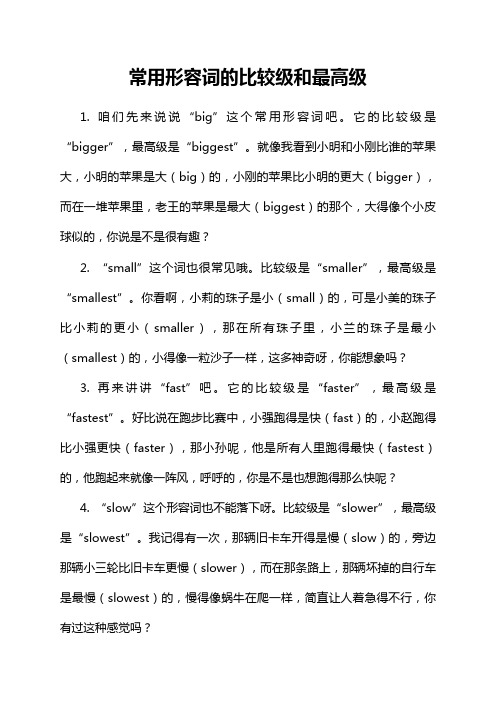

形容词的比较级和最高级大全以下是形容词的比较级和最高级的大全:1. 单音节形容词:比较级:在词尾加-er最高级:在词尾加-est例如:big - bigger (比较级)、biggest (最高级)2. 多音节形容词:比较级:在前面加more最高级:在前面加most例如:beautiful - more beautiful (比较级)、most beautiful (最高级)3. 不规则变化的形容词:比较级:在前面加more最高级:在前面加most例如:good - better (比较级)、best (最高级)4. 以y结尾的形容词:比较级:将y变成i,再加上-er最高级:将y变成i,再加上-est例如:happy - happier (比较级)、happiest (最高级)5. 以le结尾的形容词:比较级:在词尾加上-er最高级:在词尾加上-est例如:possible - more possible (比较级)、most possible (最高级)6. 少数不规则变化的形容词:比较级:在前面加more最高级:在前面加most例如:famous - more famous (比较级)、most famous (最高级)7. 特殊的比较级和最高级:例如:well - better (比较级)、best (最高级)8. 副词的比较级和最高级:比较级:在后面加-er最高级:在后面加-est例如:slowly - more slowly (比较级)、most slowly (最高级)以上是常见的形容词的比较级和最高级,但是也有一些不规则变化的形容词需要记忆。
同时,需要注意的是,有些形容词没有比较级和最高级,如unique。

形容词比较级和最高级形容词比较级和最高级用于比较两个或更多事物的特征或性质。
以下是形容词比较级和最高级的形式和用法:比较级的形式:1. 一般形容词的比较级在词尾加上-er,例如:taller(更高的)、faster(更快的)。
2. 以字母e结尾的形容词,在词尾加上-r,例如:nicer(更好的)。
3. 以辅音字母+元音+辅音字母结尾的单音节形容词,双写最后一个辅音字母,再加上-er,例如:bigger(更大的)。
4. 以重读闭音节结尾的双音节及多音节形容词,在词尾加上-er,例如:happier(更快乐的)。
最高级的形式:1. 一般形容词的最高级在词尾加上-est,例如:tallest(最高的)、fastest(最快的)。
2. 以字母e结尾的形容词,在词尾加上-st,例如:nicest(最好的)。
3. 以辅音字母+元音+辅音字母结尾的单音节形容词,双写最后一个辅音字母,再加上-est,例如:biggest(最大的)。
4. 以重读闭音节结尾的双音节及多音节形容词,在词尾加上-est,例如:happiest(最快乐的)。
注意事项:1. 有些形容词的比较级和最高级形式是不规则的,例如:good (better,best)、bad(worse,worst)。
2. 当形容词以-y结尾时,变为-i加-er或-i加-est,例如:funny (funnier,funniest)。
3. 对于很多双音节或多音节的形容词,可以在前面加上more (比较级)或most(最高级)来构建比较级或最高级形式,例如:beautiful(more beautiful,most beautiful)。
使用比较级和最高级时,常用的表达方式有:1. 比较级+than(比……更……):He is taller than his brother.(他比他兄弟更高。
)2. the+最高级+of(最……的……):She is the smartest student in the class.(她是班里最聪明的学生。

形容词比较级和最高级单词表以下是形容词比较级和最高级单词表,可以帮助你更好地描述和比较事物。
一般规则:比较级:在词尾加-er或在前面加more最高级:在词尾加-est或在前面加most注意:有些形容词的比较级和最高级形式有变化,需要特别注意。
形容词比较级最高级big bigger biggestsmall smaller smallestquick quicker quickestslow slower slowesthot hotter hottestcold colder coldestfar farther/further farthest/furthestold older oldestyoung younger youngestgood better bestbad worse worstlittle less leastmuch more mostmany more mostfew fewer fewestnear nearer nearestlate later latest/lastearly earlier earliest/first 此外,还有一些特定形容词的比较级和最高级形式需要牢记:形容词比较级最高级good-looking better-looking best-lookingbad-tempered worse-tempered worst-temperedwell-behaved better-behaved best-behavedwell-known better-known best-knownmuch/many more mostlittle less leastfar farther/further farthest/furthestold elder eldestyoung junior juniormostold-fashioned more old-fashioned most old-fashioned pretty prettier prettiestugly uglier ugliestheavy heavier heaviestlight lighter lightestthick thicker thickestthin thinner thinnestlong longer longestshort shorter shortest以上就是形容词比较级和最高级单词表,希望能对你的英语学习有所帮助。

3〕比较级前的修饰词:much, even甚至, (by) far大大地, a little有点, a bit有点, still, yet, a lot很,非常常考知识点一:形容词的比较级和最高级的构成〔1〕.以不发音的e结尾,直接加-r或-st:nice—nicer—nicest large—larger—largest〔2〕.以辅字母+y结尾的,变y为i,再加-er或-est:easy—easier—easiest happy—happier—happiest〔3〕.以“辅元辅”结尾的,双写末尾字母,再加-er或-est: big—bigger—biggest常见的还有:thin, fat, wet, red, sadhot—hotter—hottest〔4〕.不规则变化: good—better—best many/much—more—most (好坏多少远老) bad—worse—worst little(少)—less—leastfar—farther/further—farthest/furthestold—older/elder—oldest/eldest错,few—fewer new—newer—newest clever—cleverer tired—moretired pleased—more pleased常考知识点二:含有比较级的句型结构1) A is ...than B: A比B更.... The earth is bigger than the moon.2) A do sth ...than B: A比B更.... He works harder than us.【中考题】China has become much__________(strong)than before. We are proud of her.3)Which/ Who is ...., A or B? “A和B哪个/谁更...?”4)... and ... “越“越来越...”When spring comes, the days are getting longer and longer.5、Three students ran faster than Lily in the race. Lily was ________.(2012年佛山,34)A. the fourthB. fourC. the thirdD. three6、—Is Beijing a city with a long history? (2012年湛江,23)— Of course. And after the Olympic Games, __ people came to Beijing for a visit during the vacation.A. thousands ofB. thousandC. five thousandsD. five thousand of二、用所给词的适当形式填空。

形容词的比较级和最高级一、形容词的比较级和最高级在我们日常生活中,我们经常会使用形容词来描述事物的特点。
有时候,我们需要对这些形容词进行比较,以便更好地了解它们之间的差异。
这时候,我们就需要用到形容词的比较级和最高级。
本文将从理论和实践两个方面,详细探讨形容词的比较级和最高级的概念、用法以及注意事项。
二、比较级和最高级的概念1. 比较级比较级是用来表示两个或多个事物在某一方面上的相对大小关系的。
在英语中,形容词的比较级通常在词尾加上-er。
例如:big(大的)→ bigger(更大的)、fast(快的)→ faster(更快的)。
也有一些形容词的比较级是通过改变词根或词缀来实现的,如:good(好的)→ better(更好的)、bad(坏的)→ worse(更坏的)。
2. 最高级最高级是用来表示三个或三个以上的事物在某一方面上的最大程度或最小程度的。
在英语中,形容词的最高级通常在词尾加上-est。
例如:big(大的)→ biggest(最大的)、fast(快的)→ fastest(最快的)。
同样,也有一些形容词的最高级是通过改变词根或词缀来实现的,如:good(好的)→ best(最好的)、bad(坏的)→ worst(最坏的)。
三、比较级和最高级的使用1. 比较级的用法(1)修饰单数名词当我们需要比较两个事物的大小时,可以使用比较级。
例如:My car is faster than yours.(我的车比你的快。
)这里的faster表示“更快”。
(2)修饰复数名词当我们需要比较三个或三个以上的事物的大小时,可以使用最高级。
例如:This is the tallest building in the city.(这是这座城市中最高的建筑。
)这里的tallest表示“最高的”。
2. 最高级的使用(1)修饰单数名词当我们需要强调某个事物在某一方面上是最大程度时,可以使用最高级。
例如:This is the best movie I have ever seen.(这是我看过的最好的电影。

形容词比较级和最高级绝大多数形容词有三种形式,原级,比较级和最高级, 以表示形容词说明的性质在程度上的不同。
形容词的原级: 形容词的原级形式就是词典中出现的形容词的原形。
例如: poor tall great glad bad形容词的比较级和最高级: 形容词的比较级和最高级形式是在形容词的原级形式的基础上变化的。
分为规则变化和不规则变化。
形容词最高级前要加the 规则变化如下:1) 单音节形容词的比较级和最高级形式是在词尾加-er 和-est 构成。
great (原级) greater (比较级) greatese(最高级)2) 以-e 结尾的单音节形容词的比较级和最高级是在词尾加-r 和-st 构成。
wide (原级) wider(比较级) widest(最高级)3)少数以-y, -er, -ow, -ble结尾的双音节形容词的比较级和最高级是在词尾加-er 和-est 构成。
clever(原级) cleverer(比较级) cleverest(最高级)4) 以-y 结尾,但-y 前是辅音字母的形容词的比较级和最高级是把-y 去掉,加上-ier 和-est 构成.happy (原形) happier(比较级) happiest(最高级)5) 以一个辅音字母结尾其前面的元音字母发短元音的形容词的比较级和最高级是双写该辅音字母然后再加-er和-est。
big (原级) bigger(比较级) biggest(最高级)6) 双音节和多音节形容词的比较级和最高级需用more 和most 加在形容词前面来构成。
beautiful (原级)more beautiful(比较级) the most beautiful(比较级)difficult (原级) more difficult(最高级) the most difficult(最高级)常用的不规则变化的形容词的比较级和最高级:原级------比较级------最高级good------better------bestmany------more------mostmuch------more------mostbad------worse------worstfar------farther, further------farthest, furthest形容词比较级前可以加much, a bit, a little, far 解释为…的多选择:1. This box is___ that one.A. heavy thanB. so heavy thanC. heavier asD. as heavy as2. When we speak to people, we should be ' .A. as polite as possibleB. as polite as possiblyC. as politely as possibleD. as politely as possibly3. This book is____ that one, but____ than that one.A. as difficult as; expensiveB. as more difficult as; more expensiveC. as difficult as; more expensiveD. more difficult as; as expensive4. I think the story is not so ___ as that one.A. interestingB. interestedC. more interestingD. most interesting5. His father began to work____ he was seven years old.A. as old asB. as early asC. sinceD. while( )6. I think science is _ than Japanese.A. much importantB. importantC. much more importantD. more much important( ) 7 This pencil is___ than that one.A. longestB. longC. longerD. as long( ) 8 My mother is no ___ young.A. shorterB. longerC. littleD. few( ) 9 These children are ____ this year than they were last year.A. more tallB. more tallerC. very tallerD. much taller( ) 10 It was very hot yesterday, but it is___ today.A. even hotterB. more hotterC. much more hotD. much hot( ) 11. Mrs Black has got____ instead of getting any better.A. more badB. a little worseC. much badlyD. a lot of worse( ) 12. His father is____than his mother. ;A. older four yearsB. as four years olderC. four years olderD. bigger four years ( ) 13. Maths is more popular than____.A. any other subjectB. all the subjectsC. any subjectD. other subject( ) 14. China is larger than ____ in Africa.A. any other countryB. other countriesC. the other country J 1%D. any country ( ) 15. Tom is stronger than ___ in his class.A. any other boyB. any boysC. any boyD. other boy( ) 16. When spring comes, it gets____.A. warm and warmB. colder and colderC. warmer and warmerD. shorter and shorter( ) 17. By and by, ____ students in our class came to like English.A. more and moreB. much and muchC. many and manyD. less and least ( ) 18. At last he began to cry ___.A. hard and hardB. more hard and more hardC. harder and harderD. less hard and less harder( ) 19. When spring comes the days get ____ and nights ____.A. short; longB. long; shortC. longer; shorterD. shorter; longer( ) 20. Which do you like ___, tea or coffee?A. wellB. betterC. bestD. most( ) 21. This work is ____ for me than for you.A. difficultB. most difficultC. much difficultD. more difficult ( ) 22. Which do you think tastes ____, the chicken or the fish?A. goodB. betterC. bestD. well( ) 23. The Great Pyramid is about 137 metres high today, but it was onceA. higherB. highestC. high tooD. more high( ) 24. Don't you think it ______ not to write the letter?A.well ,B. betterC. bestD. good填空:1. Gold(黄金) is ______ (little) useful than iron(铁).2. My sister is two years _______ (old ) than I.3. John’s parents have four daughters, and she is the _____ (young) child.4. The _____ (cheap) bags are the not usually the best ones.5. The short one is by far _______ (expensive) of the five.6. The boy is not as ______ (interesting) as his brother.7. Dick sings _____ (well), she sings ______(well) than John, but Mary sings______(well) in her class.8. She will be much ______ (happy) in her mew house.写出下列形容词与副词的比较级与最高级形式:long_____ ______ wide ______ _______ fat ____ _____heavy____ ______ slow ______ _______ few ____ _____far____ ____ happy_____ _____ good____ ____用适当形式填空:1. Bob is _________ ( young ) than Fred but ___________ (tall) than Fred.2. Yingtian is not as ___________ (tall) as Yongxian.3. Almost all the students' faces are the same but Li Deming looks _______ (fat) than before the holidays,4. Which is _________ (heavy), a hen or a chicken?5. -- How _________ (tall) is Sally?-- She' s 1.55 metres ________ (tall).--What abod Xiaoling?-- She' s only 1.40 metres ________ (tall).She is much _______ (short) than Sally.She is also _______ (short) girl in the class.6. He is ______ (bad) at learning maths. He is much _______ (bad) at Chinese and he is the _________ (bad) at English.7. Annie says Sally is ________ (kind) person in the world.8. He is the _________(friendly) people in the class, I think.9. A dictionary is much _________ (expensive) than a story-book.10. An orange is a little ______ (big) than an apple, but much ________ (small) than a watermelon.11. The Changjiang River is _______ (long) river in China.12. Sue is a little ________ (beautiful) than her sister.13. My room is not as _________ (big) as my brother' s.14. --How difficult is physics?--I' m not sure.-- Is it ________ (difficult) than maths?-- I don' t think so.15. -- Annie plays the piano very ___________ (well).-- Sue plays it _____ (well) than Annie. And Sally plays it the __________ (well) among(在…之间) them.16. Saturday is my _________ (busy) day in a week.17. Her mother is getting ____________(fat) and ________ (fat).18. I think it' s too expensive. I' d like a _____________ (cheap) one.19. He comes to school much ____________ (early) than I.20. This book is not as _____________ (interesting) as that one.21. Your classroom is __________(wide) and ___________(bright) than ours.22. The ________ (much), the ____________ (good).23. Nowadays English is __________( important ) than any other subject, I think.24. Most of the students think a lion is much ________(dangerous) than a bear and it is __________ (dangerous) animal in the world.。
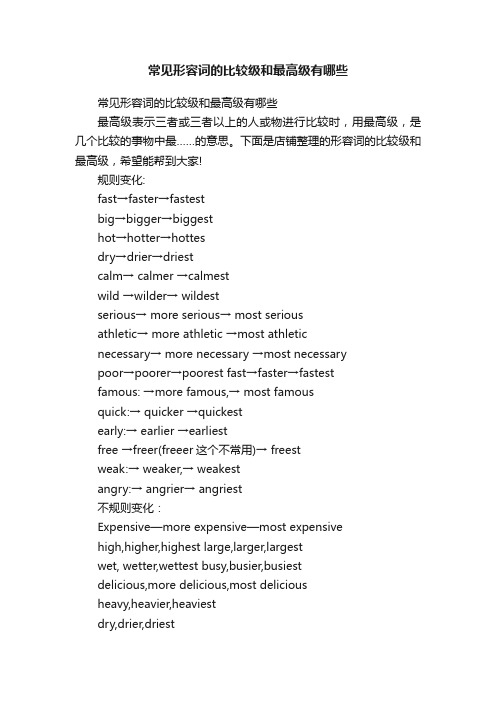
常见形容词的比较级和最高级有哪些常见形容词的比较级和最高级有哪些最高级表示三者或三者以上的人或物进行比较时,用最高级,是几个比较的事物中最……的意思。
下面是店铺整理的形容词的比较级和最高级,希望能帮到大家!规则变化:fast→faster→fastestbig→bigger→biggesthot→hotter→hottesdry→drier→driestcalm→ calmer →calmestwild →wilder→ wildestserious→ more serious→ most seriousathletic→ more athletic →most athleticnecessary→ more necessary →most necessarypoor→poorer→poorest fast→faster→fastestfamous: →more famous,→ most famousquick:→ quicker →qu ickestearly:→ earlier →earliestfree →freer(freeer这个不常用)→ freestweak:→ weaker,→ weakestangry:→ angrier→ angriest不规则变化:Expensive—more expensive—most expensivehigh,higher,highest large,larger,largestwet, wetter,wettest busy,busier,busiestdelicious,more delicious,most deliciousheavy,heavier,heaviestdry,drier,driesteasy easier easiestlazy lazier laziestpretty prettier prettiestnaughty naughtier naughtiestmealy mealier mealiestearly earlier earliestthirsty thirstier thirstiestfar→farther→farthestfar→further→furthestDull—duller--dullestLoud-louder--loudestBoring—more boring—most boringCreative—more creative—most creativeWarm---warmer--warmestgood / well→better→bestbad / ill→worse→worstmany / much→more→mostlittle→less→leastlate→later→ / latestlate→latter→last【拓展】关于形容词和副词的比较级一、含义1. 大多数形容词和副词有三个等级:原级、比较级、最高级: good – better - best2. 比较级:表示两者(人或物)之间的比较。
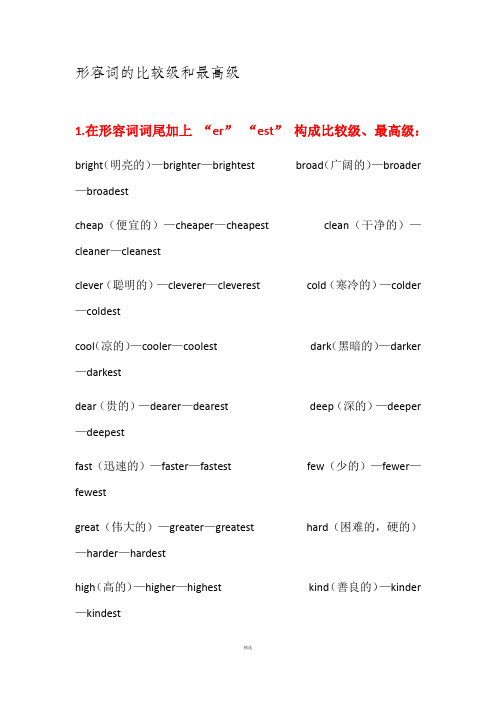
形容词的比较级和最高级1.在形容词词尾加上“er”“est”构成比较级、最高级:bright(明亮的)—brighter—brightest broad(广阔的)—broader —broadestcheap(便宜的)—cheaper—cheapest clean(干净的)—cleaner—cleanestclever(聪明的)—cleverer—cleverest cold(寒冷的)—colder —coldestcool(凉的)—cooler—coolest dark(黑暗的)—darker —darkestdear(贵的)—dearer—dearest deep(深的)—deeper —deepestfast(迅速的)—faster—fastest few(少的)—fewer—fewestgreat(伟大的)—greater—greatest hard(困难的,硬的)—harder—hardesthigh(高的)—higher—highest kind(善良的)—kinder —kindestlight(轻的)—lighter—lightest long(长的)—longer —longestloud(响亮的)—louder—loudest low(低的)—lower —lowestnear(近的)—nearer—nearest new(新的)—newer —newestpoor(穷的)—poorer—poorest quick(快的)—quicker —quickestquiet(安静的)—quieter—quietest rich(富裕的)—richer —richestshort(短的)—shorter—shortest slow(慢的)—slower —slowestsmall(小的)—smaller—smallest smart(聪明的)—smarter—smartestsoft(柔软的)—softer—softest strong(强壮的)—stronger—strongestsweet(甜的)—sweeter—sweetest tall(高的)-taller-tallest thick(厚的)—thicker—thickest warm(温暖的)—warmer—warmestweak(弱的)—weaker—weakest young(年轻的)—younger—youngest2.双写最后一个字母,再加上“er”“est”构成比较级、最高级:big(大的)—bigger—biggest fat(胖的)—fatter—fattest hot(热的)—hotter—hottest red(红的)—redder—reddest sad(伤心的)—sadder—saddest thin(瘦的)—thinner—thinnestwet(湿的)—wetter—wettest mad(疯的)—madder—maddest3.以不发音的字母e结尾的形容词,加上“r”“st”构成比较级、最高级:able(能干的)—abler—ablest brave(勇敢的)—braver —bravestclose(接近的)—closer—closest fine(好的,完美的)—finer—finestlarge(巨大的)—larger—largest late(迟的)—later —latestnice(好的)—nicer—nicest ripe(成熟的)—riper —ripestrude(粗鲁的)—ruder—rudest safe(安全的)—safer —safeststrange(奇怪的)—stranger—strangest wide(宽广的)—wider —widestwise(睿智的,聪明的)—wiser—wisest white(白的)—whiter —whitest4.以字母y结尾的形容词,把y改为i,再加上“er”“est”构成比较级、最高级:busy(忙碌的)—busier—busiest dirty(脏的)—dirtier —dirtiestdry(干燥的)—drier—driest early(早的)—earlier —earliesteasy(容易的)—easier—easiest friendly(友好的)—friendlier—friendliestfunny(好玩的)—funnier—funniest happy(开心的)—happier—happiesthealthy(健康的)—healthier—healthiest heavy(重的)—heavier —heaviesthungry(饿的)—hungrier—hungriest lazy(懒惰的)—lazier—laziestlucky(幸运的)—luckier—luckiest naughty(调皮的)—naughtier—naughtiestnoisy(嘈杂的)—noisier—noisiest pretty(美丽的)—prettier—prettiestsilly(傻的)—sillier—silliest spicy(辣的)—spicier —spiciestthirsty(渴的)—thirstier—thirstiest ugly(丑的)—uglier —ugliest5.双音节、多音节形容词,在单词前面加上“more”“most”构成比较级、最高级:afraid(害怕的)—more afraid—most afraidbeautiful(美丽的)—more beautiful—most beautifulcareful(仔细的)—more careful—most carefulcheerful(开心的)—more cheerful—most cheerfulcrowded(拥挤的)—more crowded—most crowdeddangerous(危险的)—more dangerous—most dangerousdelicious(美味的)—more delicious—most deliciousdifficult(困难的)—more difficult—most difficultexciting(令人兴奋的)—more exciting—most excitingexpensive(昂贵的)—more expensive—most expensivefamous(著名的)—more famous—most famousfrightened(受惊的)—more frightened—most frightened frightening(令人害怕的)—more frightening—most frighteninghard-working(勤奋的)—more hard-working—most hard-working helpful(有帮助的)—more helpful—most helpfulhonest(诚实的)—more honest—most honestimportant(重要的)—more important—most important interesting(有趣的)—more interesting—most interestingpolite(有礼貌的)—more polite—most politeterrible(可怕的)—more terrible—most terribletired(累的)—more tired—most tired6.不规则变化的形容词:bad(坏的)—worse—worst far(远的)—farther—farthest (far —further—furthest)good(好的)—better—best ill(病的)—worse—worstlittle(少的)—less—least many(多的)—more—most much (多的)—more—mostold(年老的)—older—oldest ( old—elder—eldest) well(好的,身体好的)—better—best。

形容词比较级和最高级more, most最高级是英语语法常用的简单的但是又能显示出英语实力的知识,作文里多用这个能提分。
小编在这里整理了相关知识,快来学习学习吧!形容词比较级和最高级more, most形容词比较级和最高级的规则变化2.形容词比较级和最高级more, most形式。
大多数双音节、三音节以及三音节以上的形容词采用“more+原级”构成比较级形式,“most+原级”构成最高级形式。
如下:2.1一般双单音节形容词careful原级→more careful比较级→most careful最高级active原级→more active比较级→most active最高级useful原级→more useful比较级→most useful最高级2.2三单音节以及三音节以上的形容词difficult原级→more difficult比较级→most difficult最高级interesting原级→more interesting比较级→most interesting最高级2.3-ed结尾的形容词tired原级→more tired比较级→most tired最高级worried原级→more worried比较级→most worried最高级欢迎转发~~~发动大家来做作业,学英语~英语作业20180413一、选择填空35.—How do you get to your office every day? Do you walk?—It’s ___ far to walk. I’lltake the subway.A.soB.quiteC.tooD.still36.—Are you leaving for home soon?—Oh,I’ve ___ got a few days in Shanghai. I haven’t finished my job here ___.A.still, yetB.already, nearlyC.still, alreadyD.yet, almost上一期英语作业20180412参考答案:33-34:BB二、分析句子的英语语法结构,并翻译成中文RAF Akrotiri in Cyprus is at the sharp end of the British military presence in the eastern Mediterranean. Rumour is rife on the island that the installation would be targeted if Russia were to retaliate in the event of US-led military action in Syria.【卫报The Guardian】高一英语必修一必背句型1) It was the first time in a year and a half that I had seen the night face to face. (从句时态用完成时) 这是我一年半以来第一次目睹夜晚。
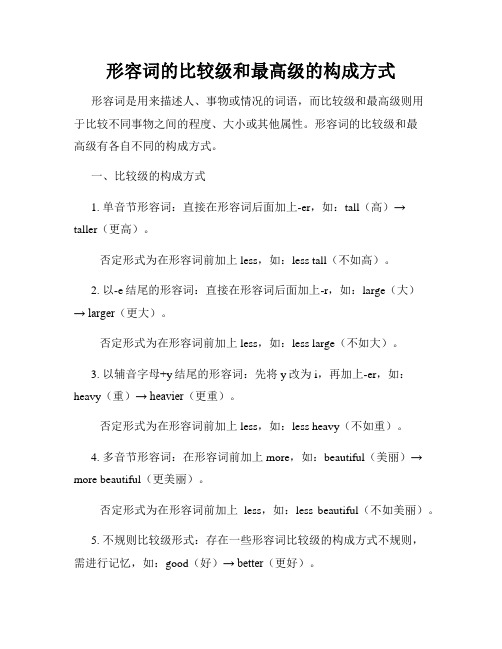
形容词的比较级和最高级的构成方式形容词是用来描述人、事物或情况的词语,而比较级和最高级则用于比较不同事物之间的程度、大小或其他属性。
形容词的比较级和最高级有各自不同的构成方式。
一、比较级的构成方式1. 单音节形容词:直接在形容词后面加上-er,如:tall(高)→ taller(更高)。
否定形式为在形容词前加上less,如:less tall(不如高)。
2. 以-e结尾的形容词:直接在形容词后面加上-r,如:large(大)→ larger(更大)。
否定形式为在形容词前加上less,如:less large(不如大)。
3. 以辅音字母+y结尾的形容词:先将y改为i,再加上-er,如:heavy(重)→ heavier(更重)。
否定形式为在形容词前加上less,如:less heavy(不如重)。
4. 多音节形容词:在形容词前加上more,如:beautiful(美丽)→ more beautiful(更美丽)。
否定形式为在形容词前加上less,如:less beautiful(不如美丽)。
5. 不规则比较级形式:存在一些形容词比较级的构成方式不规则,需进行记忆,如:good(好)→ better(更好)。
否定形式为在形容词前加上less,如:less good(不如好)。
二、最高级的构成方式1. 单音节形容词:在形容词前加上the,然后加上-est,如:tall(高)→ the tallest(最高)。
否定形式为在the前加上least,如:the least tall(最不高)。
2. 以-e结尾的形容词:在形容词前加上the,然后加上-st,如:large(大)→ the largest(最大)。
否定形式为在the前加上least,如:the least large(最不大)。
3. 以辅音字母+y结尾的形容词:先将y改为i,再加上-est,如:heavy(重)→ the heaviest(最重)。


形容词比较级和最高级more, most最高级是英语语法常用的简单的但是又能显示出英语实力的知识,作文里多用这个能提分。
小编在这里整理了相关知识,快来学习学习吧!形容词比较级和最高级more, most形容词比较级和最高级的规则变化2.形容词比较级和最高级more, most形式。
大多数双音节、三音节以及三音节以上的形容词采用“more+原级”构成比较级形式,“most+原级”构成最高级形式。
如下:2.1一般双单音节形容词careful原级→more careful比较级→most careful最高级active原级→more active比较级→most active最高级useful原级→more useful比较级→most useful最高级2.2三单音节以及三音节以上的形容词difficult原级→more difficult比较级→most difficult最高级interesting原级→more interest ing比较级→most interesting 最高级2.3-ed结尾的形容词tired原级→more tired比较级→most tired最高级worried原级→more worried比较级→most worried最高级欢迎转发~~~发动大家来做作业,学英语~英语作业20180413一、选择填空35.—How do you get to your office every day? Do you walk?—It’s ___ far to walk. I’lltake the subway.A.soB.quiteC.tooD.still36.—Are you leaving for home soon?—Oh,I’ve ___ got a few days in Shanghai. I haven’t finishedmy job here ___.A.still, yetB.already, nearlyC.still, alreadyD.yet, almost上一期英语作业20180412参考答案:33-34:BB二、分析句子的英语语法结构,并翻译成中文RAF Akrotiri in Cyprus is at the sharp end of the British military presence in the eastern Mediterranean. Rumour is rife on the island that the installation would be targeted if Russia were to retaliate in the event of US-led military action in Syria.【卫报The Guardian】高一英语必修一必背句型1) It was the first time in a year and a half that I had seen the night face to face. (从句时态用完成时) 这是我一年半以来第一次目睹夜晚。
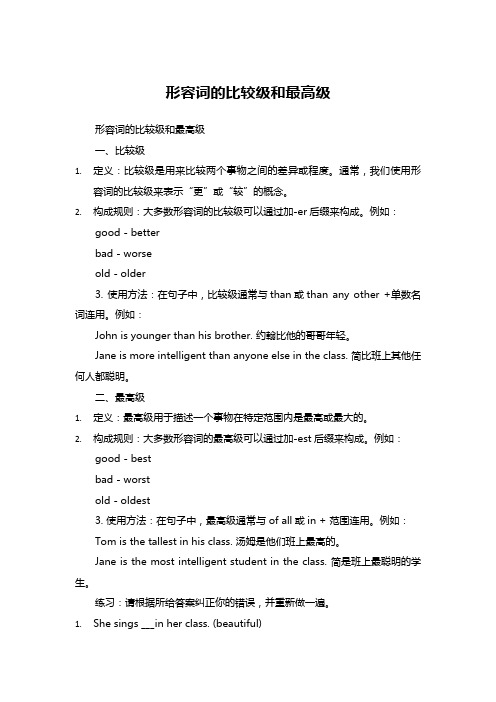
形容词的比较级和最高级形容词的比较级和最高级一、比较级1.定义:比较级是用来比较两个事物之间的差异或程度。
通常,我们使用形容词的比较级来表示“更”或“较”的概念。
2.构成规则:大多数形容词的比较级可以通过加-er后缀来构成。
例如:good - betterbad - worseold - older3. 使用方法:在句子中,比较级通常与than或than any other +单数名词连用。
例如:John is younger than his brother. 约翰比他的哥哥年轻。
Jane is more intelligent than anyone else in the class. 简比班上其他任何人都聪明。
二、最高级1.定义:最高级用于描述一个事物在特定范围内是最高或最大的。
2.构成规则:大多数形容词的最高级可以通过加-est后缀来构成。
例如:good - bestbad - worstold - oldest3. 使用方法:在句子中,最高级通常与of all或in + 范围连用。
例如:Tom is the tallest in his class. 汤姆是他们班上最高的。
Jane is the most intelligent student in the class. 简是班上最聪明的学生。
练习:请根据所给答案纠正你的错误,并重新做一遍。
1.She sings ___in her class. (beautiful)2.答案:best3.He is ___than his brother. (tall)4.答案:taller5.This book is ___than that one. (interesting)6.答案:more interesting7.The ___of all the cars here is the red one. (beautiful)8.答案:most beautiful9.She studies harder than any other student ___class. (in)。
形容词形容词的比较级和最高级形式形容词是一种用来描述人、事物属性特点的词语,通过形容词的比
较级和最高级形式,我们可以更准确地表达出不同事物之间的差异和
层次。
本文将探讨形容词形容词的比较级和最高级形式的用法和规则。
1. 形容词的比较级
形容词的比较级用来表达两个事物之间的比较关系,常用的比较级
形式为在词尾加上"-er"或在形容词前加上"more"。
以下是一些常见的比较级形式:
- old(年长的) - older(更年长的)
- tall(高的) - taller(更高的)
- beautiful(美丽的) - more beautiful(更美丽的)
要注意的是,对于以“辅音字母+y”结尾的形容词,变比较级时要将"y"变为"i"再加上"-er"。
例如:
- happy(快乐的) - happier(更快乐的)
- funny(有趣的) - funnier(更有趣的)
此外,部分双音节和多音节形容词也需要使用"more"来表示比较级。
例如:
- intelligent(聪明的) - more intelligent(更聪明的)
- important(重要的) - more important(更重要的)
2. 形容词的最高级
形容词的最高级用来表达三个或三个以上事物之间的比较关系,常用的最高级形式为在词尾加上"-est"或在形容词前加上"most"。
以下是一些常见的最高级形式:
- old(年长的) - oldest(最年长的)
- tall(高的) - tallest(最高的)
- beautiful(美丽的) - most beautiful(最美丽的)
类似于比较级,对于以“辅音字母+y”结尾的形容词,变最高级时也要将"y"变为"i"再加上"-est"。
例如:
- happy(快乐的) - happiest(最快乐的)
- funny(有趣的) - funniest(最有趣的)
同样地,双音节和多音节形容词也需要使用"most"来表示最高级。
- intelligent(聪明的) - most intelligent(最聪明的)
- important(重要的) - most important(最重要的)
3. 比较级和最高级的用法
除了上述规则之外,有一些需要特别注意的用法和规则:
3.1 长度超过两个音节的形容词在比较级和最高级前使用"more"和"most",而不是直接在词尾加上“-er”或“-est”。
例如:
- interesting(有趣的) - more interesting(更有趣的) - most interesting(最有趣的)
- expensive(昂贵的) - more expensive(更昂贵的) - most expensive(最昂贵的)
3.2 部分形容词的比较级和最高级形式有特殊变化形式:
- good(好的) - better(更好的) - best(最好的)
- bad(坏的) - worse(更坏的) - worst(最坏的)
- little(小的) - less(更小的) - least(最小的)
- many(多的) - more(更多的) - most(最多的)
以上是形容词形容词的比较级和最高级形式的基本用法和规则。
通过适当使用比较级和最高级,我们可以丰富语言表达,更准确地描述事物的特征和差异。
加强对这一语法知识点的掌握,能提升我们的表达能力,使语言更加精准、生动。
通过形容词的比较级和最高级形式,我们可以更好地描述和区分不同事物之间的特点。
掌握这一语法规则,对于写作和口语表达都是非常重要的。
希望本文能够帮助您更好地理解和运用形容词的比较级和最高级,提升自己的语言表达能力。